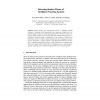110 search results - page 4 / 22 » A Metacognitive ACT-R Model of Students' Learning Strategies... |
OZCHI
2005
ACM
14 years 1 months ago
2005
ACM
Many software systems would significantly improve performance if they could interpret the nonverbal cues in their user’s interactions as humans normally do. Currently, Intellige...
ITS
2004
Springer
14 years 1 months ago
2004
Springer
Recent research has indicated that misuse of intelligent tutoring software is correlated with substantially lower learning. Students who frequently engage in behavior termed “gam...
AAAI
1998
13 years 9 months ago
1998
Software agents "living" and acting in a real world software environment, such as an operating system, a network, or a database system, can carry out many tasks for huma...
AIED
2007
Springer
14 years 2 months ago
2007
Springer
: This paper proposes the notion of problem templates (PTs), a concept based on theories of memory and expertise. These mental constructs allow experts to quickly recognise problem...
JCP
2007
13 years 7 months ago
2007
Abstract— In this paper, we develop a mixed-initiative intelligent tutor for the game of Sudoku called MITS. We begin by developing a characterization of the strategies used in S...

